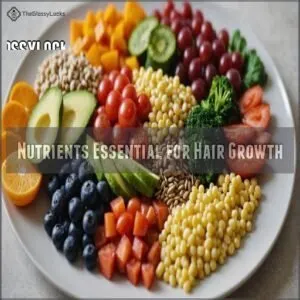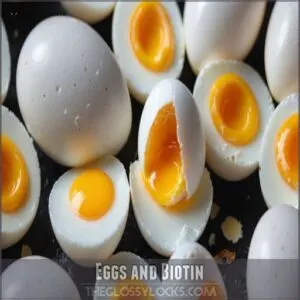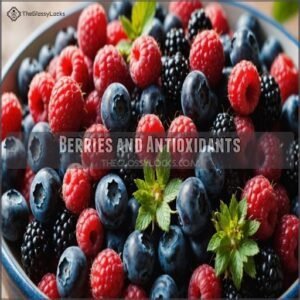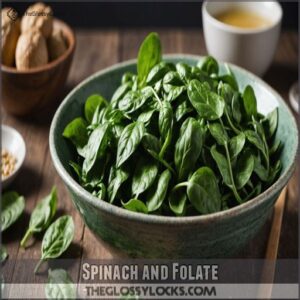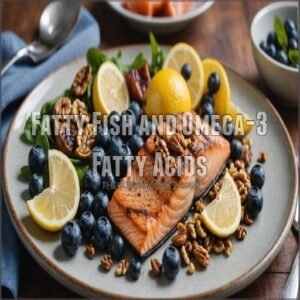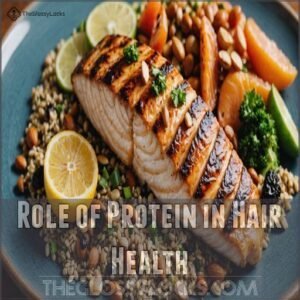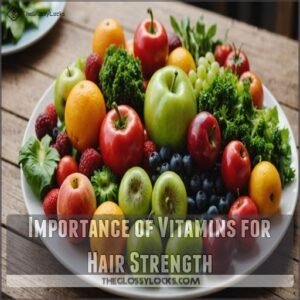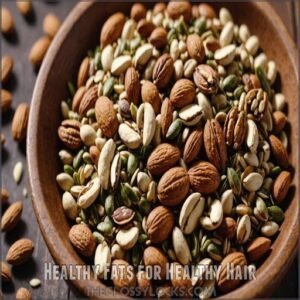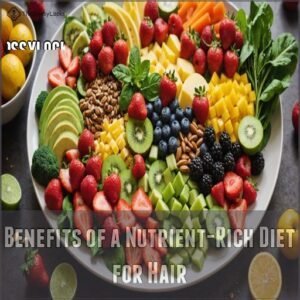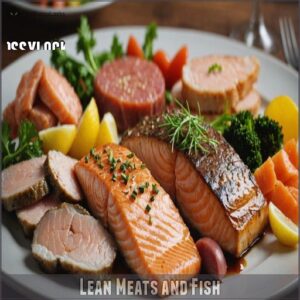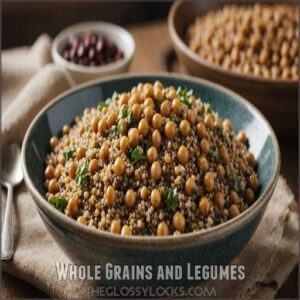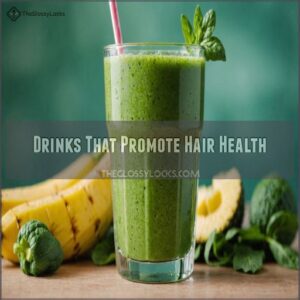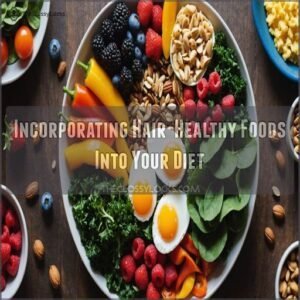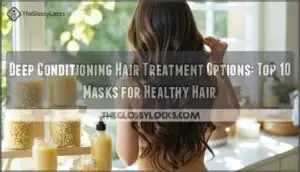This site is supported by our readers. We may earn a commission, at no cost to you, if you purchase through links.
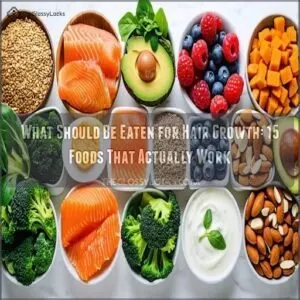 You’ll want to fuel your hair growth with nutrient-rich foods that pack a powerful punch.
You’ll want to fuel your hair growth with nutrient-rich foods that pack a powerful punch.
Eggs are your hair’s best friend, delivering essential biotin and protein for stronger strands.
Add fatty fish like salmon to your plate for omega-3s and vitamin D, while dark leafy greens provide the iron your follicles crave.
Don’t skip nuts and seeds – they’re loaded with vitamin E that keeps your scalp happy.
Think of your diet as building blocks for those luscious locks you’re after.
There’s actually a fascinating connection between your morning breakfast choices and the way your hair responds to growth signals.
Table Of Contents
- Key Takeaways
- Nutrients Essential for Hair Growth
- Foods That Promote Hair Growth
- Role of Protein in Hair Health
- Importance of Vitamins for Hair Strength
- Healthy Fats for Healthy Hair
- Benefits of a Nutrient-Rich Diet for Hair
- Foods to Eat for Hair Growth
- Drinks That Promote Hair Health
- Incorporating Hair-Healthy Foods Into Your Diet
- Frequently Asked Questions (FAQs)
- Which foods increase hair growth?
- What can I drink for hair growth?
- What foods stop hair falling?
- Which fruit is best for hair growth?
- How long until diet changes affect hair growth?
- Can spicy foods impact hair loss or growth?
- Should supplements replace food for hair health benefits?
- Does meal timing matter for optimal hair growth?
- Are there foods that actively prevent hair growth?
- Conclusion
Key Takeaways
Here are 4 key takeaways for what should be eaten for hair growth:
- Focus on protein-rich foods like eggs, lean meats, and fish to provide essential amino acids that strengthen hair follicles and promote growth.
- Incorporate nutrient-dense fruits and vegetables, especially berries and leafy greens, to supply vitamins, minerals, and antioxidants that protect hair health.
- Don’t forget healthy fats from sources like nuts, seeds, and fatty fish, which provide omega-3s and other essential fatty acids for scalp health and hair strength.
- Stay hydrated and consider hair-friendly drinks like green tea and nutrient-packed smoothies to complement your diet and support overall hair health.
Nutrients Essential for Hair Growth
You’ll need specific nutrients to maintain healthy hair growth, including protein, biotin, iron, and vitamins A, C, and D.
Your diet choices directly affect your hair’s strength and growth rate, so eating the right foods can make a noticeable difference in your hair’s health.
Protein-Rich Foods
Your hair’s foundation starts with protein, since hair follicles are made almost entirely of protein.
You’ll want to focus on complete proteins like eggs, lean meats, and fish, which provide all essential amino acids.
For vegetarians, combining foods like rice and beans creates complete protein profiles.
Aim for 0.8 grams of protein per kilogram of body weight daily for good hair growth.
Iron and Other Minerals
Iron deficiency can put the brakes on your hair growth journey.
If you’re struggling with iron deficiency, consider incorporating iron supplements into your routine.
Beyond iron, minerals like zinc and selenium play key roles in maintaining healthy follicles.
You’ll find these powerhouse minerals in foods like lean meats, oysters, and pumpkin seeds.
If you’re struggling with thinning hair, getting your iron levels checked might be the first step toward stronger, healthier locks.
Vitamins and Antioxidants
Beyond minerals, vitamins and antioxidants pack a powerful punch for hair health.
These nutrients, similar to those found in natural henna and mehndi for hair growth, work like your body’s own defense team, protecting hair follicles from damage while supporting healthy growth.
They’re especially important for addressing common issues like hair growth vitamins for women.
Here’s what these powerhouse nutrients do:
- Vitamin C builds collagen that keeps hair roots strong
- Vitamin A helps produce natural hair oils
- Antioxidants shield follicles from environmental stress
Think of them as your hair’s personal bodyguards, working 24/7 to keep those strands thriving.
Foods That Promote Hair Growth
You’ll find that certain foods can greatly boost your hair growth by providing essential nutrients like biotin, protein, and vitamins A, C, and D.
Research shows that eggs, berries, spinach, and fatty fish are particularly effective at promoting healthy hair growth through their unique combinations of hair-supporting nutrients.
Eggs and Biotin
While many nutrients support hair growth, eggs pack a powerful punch as nature’s multivitamin for your locks.
They’re loaded with biotin and protein, essential building blocks for healthy hair.
Here’s a breakdown of what eggs offer:
| Nutrient | Amount per Egg | Benefits for Hair |
|---|---|---|
| Protein | 6g | Builds hair structure |
| Biotin | 10mcg | Promotes keratin production |
| Selenium | 15mcg | Protects follicles |
| Zinc | 0.6mg | Supports hair tissue growth |
| Vitamin D | 41 IU | Activates hair follicles |
Berries and Antioxidants
Berries pack a powerful punch for hair health.
These tiny fruits are loaded with vitamin C, an essential antioxidant that protects your hair follicles from free radical damage.
Just one cup of strawberries delivers more than 85mg of vitamin C – that’s your daily requirement covered.
The antioxidants in berries also boost collagen production, which helps strengthen your hair and prevent breakage.
Spinach and Folate
Just like your favorite leafy green superhero, spinach packs a punch for your hair.
It’s loaded with folate, iron, and vitamins A and C – your hair’s best friends.
Adding a handful to your smoothie or salad bowl gives you the nutrients needed to keep your locks strong and healthy.
Plus, its iron content helps oxygen reach your hair follicles, promoting natural growth.
Fatty Fish and Omega-3 Fatty Acids
Since your body can’t produce omega-3s naturally, fatty fish become your hair’s best friend.
Loading up on salmon, mackerel, and sardines delivers these essential nutrients straight to your follicles.
Here’s what fatty fish bring to your hair care routine:
- Rich in protein that builds stronger strands
- Packed with vitamin D3 that wakes up dormant follicles
- Contains selenium to protect scalp health
- Provides B vitamins for faster growth
- Offers zinc to prevent hair loss and breakage
Role of Protein in Hair Health
Protein is a key building block for healthy hair growth, forming the foundation of your hair’s structure.
You’ll find this essential nutrient in a variety of foods, including beef, chicken, fish, dairy products, legumes, and whole grains.
Beef and Chicken
For hair health, beef and chicken pack a powerful protein punch.
These lean meats are rich in essential amino acids that your hair craves for growth and strength.
They’re also loaded with iron and zinc, two minerals vital for preventing hair loss.
If you’re not a meat-eater, don’t worry – there are plenty of plant-based alternatives that can deliver similar benefits for your luscious locks.
Fish and Dairy Products
For your hair’s health, fish and dairy are protein powerhouses.
Fish, especially fatty varieties like salmon, pack a double punch with omega-3s that nourish your scalp.
Meanwhile, dairy products offer calcium and vitamin D, supporting hair follicle strength.
Yogurt, cheese, and milk can be your go-to for hair-boosting nutrients.
Remember, a balanced diet including these foods may help you achieve that lustrous mane you’re after.
Legumes and Whole Grains
Legumes and whole grains pack a powerful protein punch for your hair.
These plant-based powerhouses are loaded with iron and zinc, key players in keeping your locks luscious.
Think lentils, chickpeas, quinoa, and oats.
They’re not just filling – they’re fueling your follicles.
By adding these to your plate, you’re giving your hair the building blocks it needs to grow strong and healthy.
Importance of Vitamins for Hair Strength
Vitamins play a key role in maintaining hair strength and promoting growth.
You’ll find that incorporating vitamin-rich foods into your diet can support healthier, more resilient hair follicles and potentially reduce hair loss.
Vitamin a and Hair Growth
Vitamin A plays a significant role in your hair’s health and growth.
It helps produce sebum, which moisturizes your scalp and keeps hair follicles healthy.
A hair growth diet rich in vitamin A, such as those found in hair growth products, can help support a healthy scalp.
While a deficiency can lead to hair loss, too much can be harmful.
Aim for balance by eating foods rich in vitamin A, like sweet potatoes, carrots, and spinach.
These nutrients support the hair growth cycle and maintain overall hair health.
Vitamin C and Collagen
You’ve heard about vitamin A, but let’s talk about vitamin C‘s role in your hair health.
This powerhouse nutrient is key for collagen production, which keeps your hair strong and resilient.
Here’s why vitamin C matters:
- Boosts collagen synthesis
- Protects hair follicles from damage
- Enhances iron absorption
- Fights free radicals
- Promotes scalp health
By incorporating vitamin C-rich foods into your diet, you’re not just helping your hair—you’re giving your whole body a boost. It’s like a two-for-one deal for your health!
Vitamin D and Hair Health
Your hair’s health might depend on catching some rays. Vitamin D, often called the sunshine vitamin, plays a major role in hair follicle cycling.
Low levels have been linked to hair loss, so getting enough is key for maintaining a healthy mane.
While sunlight’s the best source, you can also boost your intake through fatty fish, egg yolks, and fortified foods.
If you’re concerned about deficiency, chat with your doctor about supplements.
Healthy Fats for Healthy Hair
Your hair needs healthy fats to thrive, and incorporating the right oils and fats into your diet can make a significant difference.
Nuts, seeds, and certain oils provide essential fatty acids that nourish hair follicles and promote growth, potentially leading to stronger, shinier locks.
Oils and Conditioners
Nourishing your hair from the outside can complement a healthy diet.
Oils and conditioners play a key role in maintaining hair health and promoting growth.
They provide essential fatty acids and moisture, keeping your locks strong and shiny.
Here are some options to keep in mind:
- Coconut oil for deep conditioning and scalp massage
- Argan oil to tame frizz and add shine
- Avocado-based hair masks for intense hydration
Incorporating these into your hair care routine can work wonders for your mane’s health and appearance.
Nuts and Seeds
Nuts and seeds pack a powerful punch for hair health.
They’re loaded with essential nutrients like protein, biotin, and omega-3 fatty acids.
Snack on almonds, walnuts, and pumpkin seeds to give your locks a boost.
These nutrient-dense powerhouses also provide zinc and selenium, which support scalp health.
Incorporating a handful of mixed nuts and seeds into your daily diet can contribute to stronger, shinier hair over time.
Benefits of a Nutrient-Rich Diet for Hair
Your hair’s health starts with what’s on your plate. A nutrient-rich diet provides essential vitamins, minerals, and proteins that support hair growth, strength, and overall health.
Hair Growth Support
A nutrient-rich diet gives your hair the building blocks it needs to grow strong and healthy.
Incorporating natural hair growth remedies for damaged hair, such as those using egg yolk, avocado, and coconut oil, into your routine can help strengthen and revitalize your locks, as seen in natural hair growth remedies. Let’s look at how specific foods support your hair’s natural growth cycle.
Think of your hair like a garden – it needs the right nutrients to flourish.
- Protein builds keratin, your hair’s main structural component
- B-vitamins create red blood cells that carry oxygen to follicles
- Zinc helps repair and maintain hair tissue
- Iron prevents follicle starvation
- Vitamin C boosts collagen production for stronger strands
Preventing Hair Loss
A balanced diet can stop hair loss in its tracks.
If you’re noticing more strands in your brush than usual, it’s time to check what’s on your plate.
Simple dietary changes often work better than expensive treatments.
Loading up on the right nutrients helps maintain healthy follicles and reduces shedding.
Think of your diet as a shield, protecting your hair from thinning and breakage.
Nutrient-Rich Foods
A well-stocked plate packed with nutrient-rich foods works like nature’s multivitamin for your hair.
Foods high in biotin, protein, and essential vitamins can transform your hair from lackluster to vibrant.
You’ll want to focus on a diverse mix of colorful fruits, leafy greens, lean proteins, and whole grains.
When you’re feeding your body these powerhouse nutrients, you’re basically giving your hair follicles exactly what they need to thrive.
Foods to Eat for Hair Growth
You’ll find that certain foods can directly support your hair’s growth cycle by providing essential nutrients like protein, biotin, and vitamins, especially during the anagen phase growth period. You’ll find that certain foods can directly support your hair’s growth cycle by providing essential nutrients like protein, biotin, and vitamins.
Research shows that eating a balanced diet rich in lean meats, whole grains, and colorful fruits and vegetables can help maintain healthy hair follicles and prevent nutritional deficiencies that may lead to hair loss.
Lean Meats and Fish
Lean meats and fish deliver essential nutrients that power hair growth from within.
When you’re looking to strengthen those locks, protein-packed options make all the difference.
For a healthy scalp that can support strong hair growth, you can explore survival strategies for felons for insights into proper nutrition and well-being.
Here’s what works best:
- Wild-caught salmon packs omega-3s that reduce inflammation and support scalp health
- Lean chicken breast provides the building blocks for strong, resilient strands
- Ginger, known for its potential to boost hair growth with ginger, also fights dandruff and restores scalp balance, while grass-fed beef offers iron and zinc, preventing hair loss and boosting growth
Whole Grains and Legumes
Several whole grains and legumes pack the protein and biotin your hair craves.
Quinoa, lentils, and chickpeas deliver essential amino acids that strengthen hair follicles from within.
Incorporating iron-rich foods like spinach, as discussed in foods to eat for hair growth, can also help combat hair loss.
You’ll find biotin, zinc, and these hair-friendly compounds – nutrients that combat hair loss and promote growth.
Black beans and oats are particularly rich in these hair-friendly compounds, making them excellent choices for your daily menu.
Fruits and Vegetables
Your hair’s growth journey starts with essential nutrients like those found in bananas for hair growth, in your kitchen with colorful fruits and veggies.
Load up on vitamin C-rich citrus fruits to boost collagen production, while dark leafy greens provide iron and folate for stronger strands.
Sweet potatoes pack vitamin A for scalp health, and bell peppers offer antioxidants that protect follicles.
Mix these into superfood salads or blend them into nutrient-packed veggie juices for maximum benefits.
Drinks That Promote Hair Health
While you’re focusing on hair-healthy foods, don’t forget that what you drink plays a vital role in maintaining strong, healthy hair from root to tip.
You’ll find that certain beverages, from green tea to nutrient-packed smoothies, can support your hair growth goals when combined with proper nutrition and hydration.
Staying Hydrated
Proper hydration plays a key role in maintaining healthy hair growth.
When you’re dehydrated, your body prioritizes essential organs over hair follicles, leading to dry, brittle strands.
Aim to drink 8-10 glasses of water daily, spacing them throughout the day.
Keep track of your hydration by checking urine color—pale yellow indicates good hydration.
Consider infusing water with citrus or cucumber for added nutrients.
Herbal Teas
Drinking herbal teas can boost hair growth through their rich antioxidant content.
Green tea, in particular, contains green tea benefits for skin hair, as it may block DHT, a hormone linked to hair loss.
Green tea, in particular, contains EGCG compounds that may block DHT, a hormone linked to hair loss.
Chamomile tea soothes the scalp and reduces inflammation, while rosemary tea stimulates blood circulation to hair follicles.
Nettle tea provides minerals that strengthen hair strands, and hibiscus tea promotes collagen production.
Smoothies and Juices
Fresh smoothies and juices pack powerful nutrients for your hair in one glass.
Smoothies and juices are a delicious and easy way to get multiple hair-boosting ingredients at once.
Blend spinach, berries, and Greek yogurt for a protein-rich smoothie that supports follicle health.
Try juicing carrots with apples and ginger – it’s loaded with beta-carotene and vitamin C.
These drinks make it easy to get multiple hair-boosting ingredients at once, plus they’re delicious and taste great.
Incorporating Hair-Healthy Foods Into Your Diet
You don’t need to overhaul your entire diet to support healthy hair growth, as you can start by making small, strategic changes to include nutrient-rich foods in your daily meals.
Research shows that combining protein-rich foods like eggs with antioxidant-packed berries and leafy greens can provide the essential nutrients your hair needs to thrive.
Meal Planning and Preparation
Planning your hair-growth meals doesn’t have to be complicated.
With a bit of organization, you can make nutrient-rich eating a breeze.
Here’s how to get started:
- Create a weekly menu focusing on protein, healthy fats, and iron-rich foods
- Shop once a week to make sure fresh ingredients are always available
- Prep ingredients in advance for quick assembly
- Use airtight containers to keep nutrients intact longer
Healthy Snacking
You can boost your hair health with smart snacking throughout the day.
Here are some nutrient-packed options that support hair growth:
| Quick Snacks | Benefits for Hair |
|---|---|
| Almonds & walnuts | Omega-3s & vitamin E |
| Greek yogurt & berries | Protein & antioxidants |
| Hard-boiled eggs | Biotin & essential proteins |
| Pumpkin seeds | Zinc & healthy fats |
Keep these hair-friendly snacks at your desk or in your bag for easy access anytime.
Mindful Eating
Being present during meals helps you make better choices for hair health.
By focusing on essential nutrients like those found in a hair growth diet for men, you’re more likely to notice how your body responds to different foods.
Keep a food diary to track which nutrients support your hair growth goals.
Pay attention to portion sizes and emotional eating triggers, ensuring you’re getting enough protein, vitamins, and minerals consistently throughout the day.
Frequently Asked Questions (FAQs)
Which foods increase hair growth?
Like a garden needs rich soil, your hair craves nutrients to grow strong and healthy.
Eggs provide protein and biotin.
Berries are packed with antioxidants.
Spinach contains iron and vitamins.
Fatty fish are a good source of omega-3s.
What can I drink for hair growth?
Green tea, coconut water, and smoothies rich in berries and spinach can boost your hair growth.
Try adding protein shakes with biotin-rich ingredients.
And don’t forget to stay hydrated with plenty of water.
What foods stop hair falling?
Powerfully prevent pesky hair loss with protein-packed eggs, omega-rich salmon, and iron-loaded spinach.
You’ll also want berries for vitamin C and fatty fish that’s full of D3 – they’re great for growth.
Which fruit is best for hair growth?
Berries are your best bet for hair growth thanks to their high vitamin C content.
Berries like strawberries, blueberries, and blackberries boost collagen production and protect your hair follicles.
How long until diet changes affect hair growth?
You’ll notice improvements in hair health within 3-6 months of making dietary changes. Since hair grows about 1/2 inch monthly, it takes time for nutrients to affect new growth from follicles.
Can spicy foods impact hair loss or growth?
While MSM has shown potential in promoting hair growth through its anti-inflammatory effects on scalp circulation. There’s no direct evidence linking spicy foods to hair loss or growth.
While capsaicin in spicy foods may increase blood circulation to your scalp, it’s not proven to impact your hair’s health in a major way.
Should supplements replace food for hair health benefits?
While supplements can be helpful, they shouldn’t replace a balanced diet for hair health.
Whole foods offer a complex mix of nutrients that work synergistically.
Consult a doctor before adding supplements, as they’re not always necessary or beneficial.
Does meal timing matter for optimal hair growth?
Meal timing isn’t the magic bullet for hair growth.
While consistent nutrient intake supports overall health, your body doesn’t have a "hair growth hour."
Focus on a balanced diet throughout the day for the best results.
Are there foods that actively prevent hair growth?
No foods directly prevent hair growth, but some might indirectly impact it.
Excessive sugar, processed foods, and alcohol can contribute to nutrient deficiencies and inflammation.
Moderation is key.
Focus on a balanced diet rich in vitamins and minerals instead.
Conclusion
Ready to transform your hair from the inside out?
Remember, what should be eaten for hair growth isn’t just about single foods, but a balanced diet rich in nutrients.
By incorporating these 15 powerful foods into your meals, you’re giving your hair the building blocks it needs to thrive.
Consistency is key, so make these foods a regular part of your routine.
With patience and proper nutrition, you’ll be on your way to healthier, stronger, and more vibrant locks.
Your hair’s future is in your hands—and on your plate.

